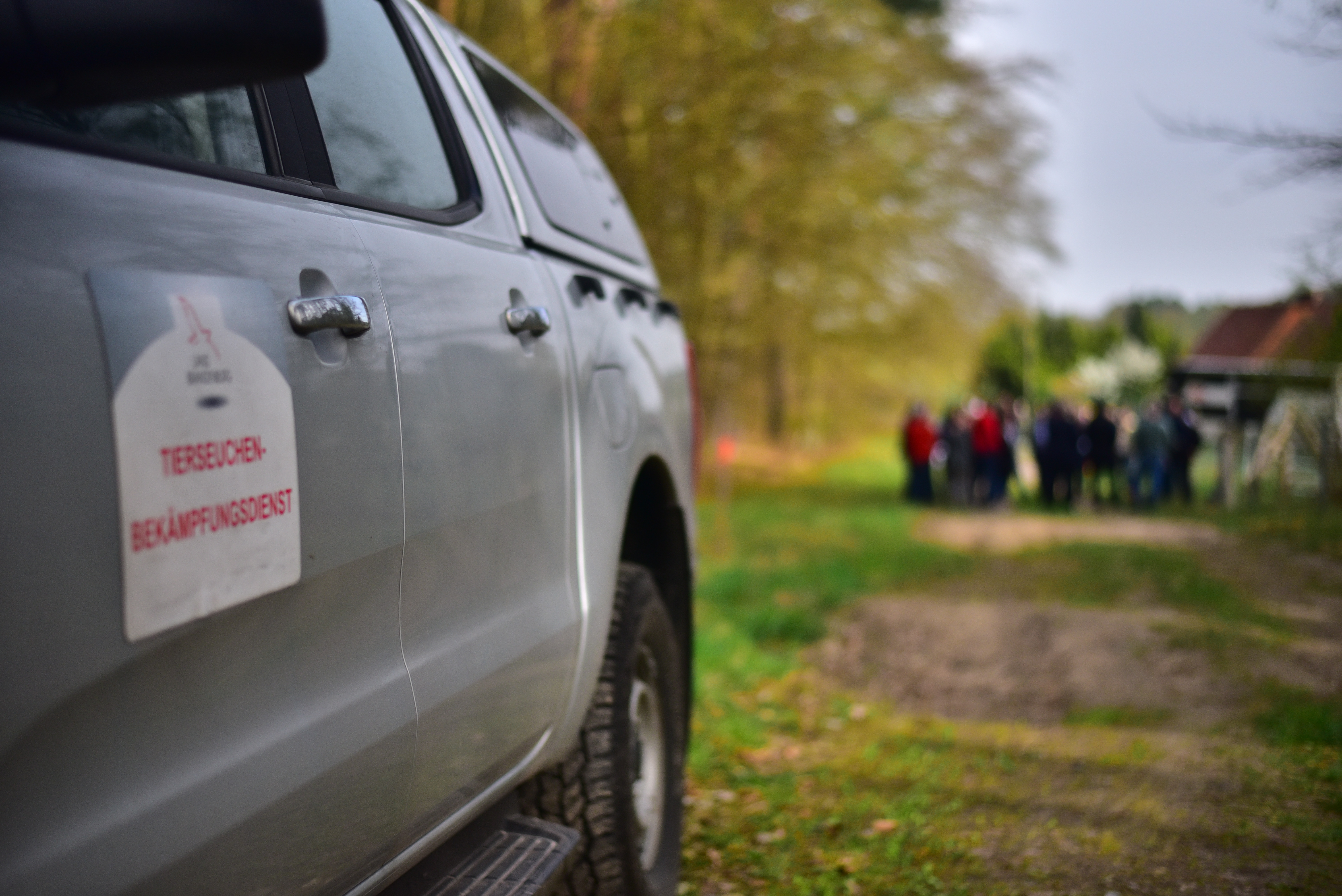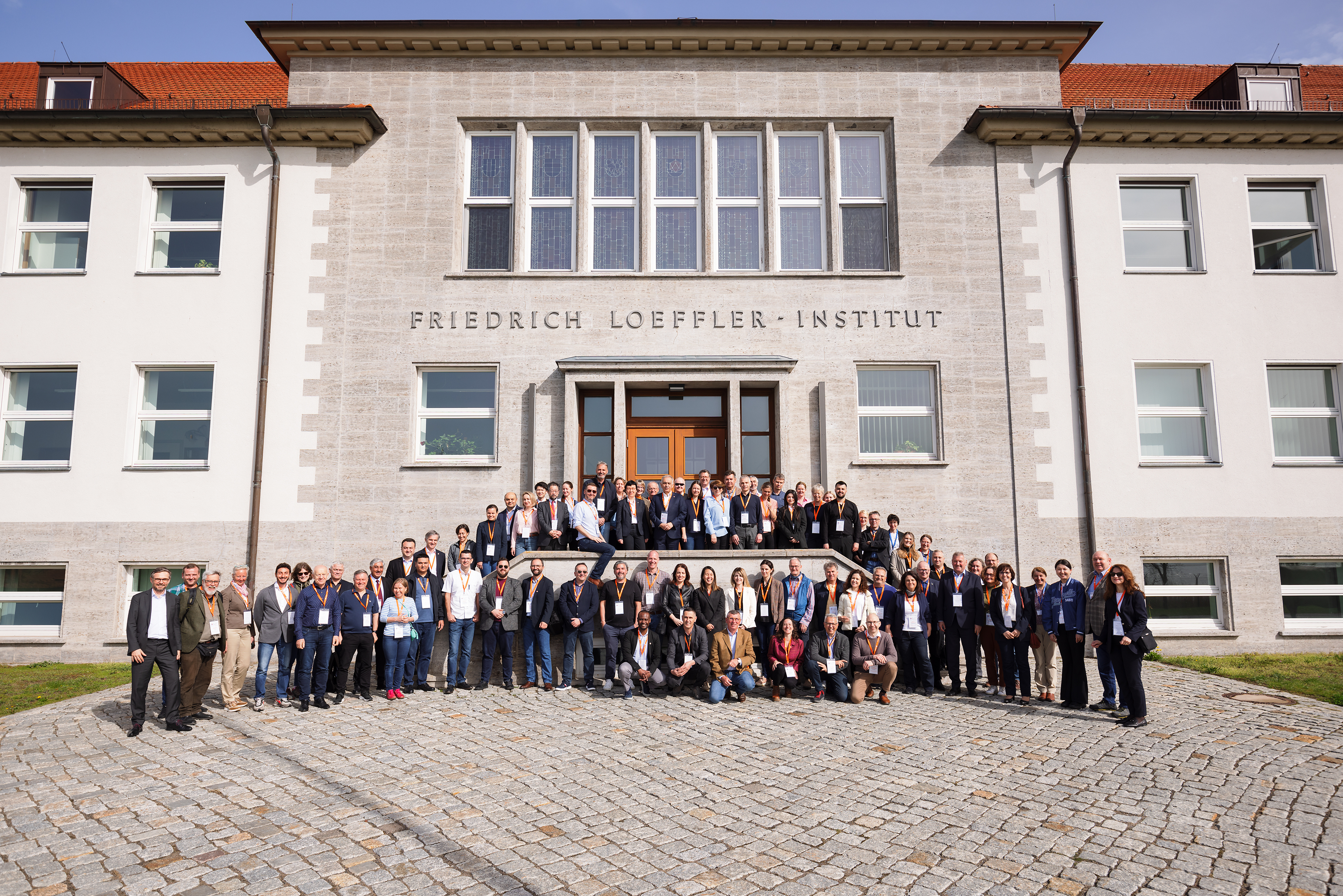The twenty second meeting of the Standing Group of Experts on African Swine Fever (SGE ASF22) was organised in the Friedrich-Loeffler-Institut (German animal virology reference laboratory) and Mecklenburg, Germany, by the SGE ASF Secretariat on the 8/9th of April 2024. 21 SGE Member Countries from the European Region participated, for a total of over 90 participants in FLI and 75 in the field visits.
After a brief overview of regional activities from Asia Pacific and Europe, the new member countries briefly presented their national epidemiological situation regarding ASF.
Participants, including representatives of local German veterinary services, gave presentations of the opportunities and challenges in the use of fencing in control of ASF in wild boar, that were illustrated by field visits on the second day.
The SGE ASF22 were shown a set of recommendations. Amongst these, it was highlighted that:
The SGE ASF agreed that the eradication of ASF from the European region remains the primary goal. In addition, participants agreed that while not all countries may possess the financial means for state-of-the-art fencing and technological solutions, there are universal principles applicable at the local level. These include understanding wild boar distribution, engaging key stakeholders in control measures, and launching public awareness campaigns.
The participation of a representative from the Asia-Pacific region offered valuable parallels in the global fight against ASF, shedding light on shared challenges and effective control strategies needing adaptation to local contexts.
The importance of cross-border cooperation emerged as a recurrent theme, particularly given the prevalence of shared land borders among member states. The movement of wild boars across these borders poses a significant risk for virus transmission, underscoring the necessity for collaborative efforts.
The collaborative spirit and exchange of knowledge fostered by the SGE on ASF remain useful in advancing efforts towards ASF eradication, both regionally and globally.
Next meeting
Presentations are available in the agenda below
Day 0 – 7th of April 2024 – from 19:30 – Berlin
| From 19:30 | Welcome buffet in hotel close to Berlin Airport (Intercity hotel TBC) | |
| 2 hours | Buffet and social gathering | Hosts: Germany and GF-TADs |
Day 1 – 8th of April 2024 – 07.00 – 17.00 – Friedrich-Loeffler-Institut
| 07:00-10.30 | Travel from Intercity hotel to Friedrich Loeffler Institut in Greifswald insel Riems | |
| 10:30 – 10:45 | Refreshment – coffee | |
| 15 minutes | Welcoming remarks | Prof Kühn, Head of FLI
Dr Dietrich Rassow Dr Budimir Plavsic (SGE Secretariat) Dr Bernard Van Goethem |
| 30 | Presentation of the activities in Asia | Dr Okita Vice President of the regional Commission for Asia and the Pacific |
| 10 | WOAH presentation on ASF activities including work on the eDepository | WOAH – Dr Chng and Perchet |
| 10 | FAO presentation on ASF activities | FAO REU Daniel Beltran Alcrudo |
| 10 | EU presentation on ASF activities | DG Santé |
| 5 | Discussion | |
| 10 | Presentation Albania epidemiological situation | Esta Papajani |
| 10 | Presentation Montenegro epidemiological situation | Dr Mevlida Hrapovic |
| 10 | Presentation of the Montenegro SGE mission | Dr Olsveskis |
| 10 | Presentation Greece epidemiological situation | Dr Maria Gianniou |
| 10 | Presentation Sweden epidemiological situation | Dr Caroline Bossfall |
| 5 | discussion | |
| 13:00 – 14.30 | Lunch break – optional tour of the FLI Island | |
| 20 | Overview of ASF in Germany, including public relations work (A) | Dr Christina Haarmann, Federal Ministry + Prof Carola Sauter-Louis, FLI |
| 30 | ASF in Brandenburg (BB): Prevention and ASF control based on individual examples (fences, search for dead game) | Diana Holland
|
| 30 | ASF in Mecklenburg-Western Pomerania (MV): Prevention and ASF control based on individual examples (fences, search for dead game) | Dr Stephanie Woida |
| 30
|
Report /Presentation local veterinary and regional forestry authority
Debate on individual issues arising from the discussion |
Nicole Lade, local district Vorpommern-Greifswald |
| 10 | Discussion | |
| 16:30 – 16:40 hrs | Coffee break | |
| 15 | Presentation of the Italian experience on ASF control | TBC |
| 10 | Presentation of current French prevention plan and the past cross boundary cooperation with Belgium including fencing. | Dr Emmanuelle Soubeyran |
| 15 | Evolution of fencing solutions used in Europe, and the possible future role of vaccination against ASF | Dr Vittorio Guberti |
| 10 | Discussion and questions | |
| 17.10 | Wrap up of the first day presentations | |
| 18.00 hrs | Departure for Anklam and travel | |
| 19:30 hrs | Dinner in Anklam | |
| 21.30 | Accommodation – hotel in Anklam |
Day 2 April 9th, 2024 excursion to Mecklenburg-Western Pomerania
Note: Departure from Hotel in Anklam
| Schedule | Stops | Contents |
| 08:20-9:20 | Travel from hotel (Anklam) to fences | Bus travel |
| 9:20 | Fence close to Rieth
53.689683/14.271816 |
ASF protection corridor POL-DEU border |
| 10:35 | Green close to Sandbad Ahlbeck (PLZ 17375) (three groups in parallel)
500m footpath – appropriate footwear and clothing for countryside |
Demonstration search for carcasses (dogs) |
| Trapping | ||
| Demonstration of a drone used in carcass searching | ||
| 11:45 | Gasthof zum Seegrund
Dorfstr. 32, 17375 Ahlbeck – Lunch |
|
| 13:30 – 16.30 | return journey to Berlin, with conclusions and recommendations to be presented on the way | |
| 16.30 | Return to Berlin airport | |
| 18.00 – | Optional walk in Berlin | |
The list of SGE ASF members and prospective members is as follows: Belarus, Bosnia and Herzegovina, Bulgaria, Croatia, Czechia, Estonia, Germany, Greece, Hungary, Italy, Kosovo*, Latvia, Lithuania, Moldova, Montenegro; North Macedonia, Poland, Romania, Russia, Serbia, Slovakia, Sweden, Ukraine
* This designation is without prejudice to position on status, and is in line with UN Security Council Resolution 1244/99 and the International Court of Justice Opinion on the Kosovo declaration of independence
Veranstaltung Weltorganisation für Tiergesundheit , Treffen der obersten Veterinärbehörden aus Europa, Asien, Afrika

